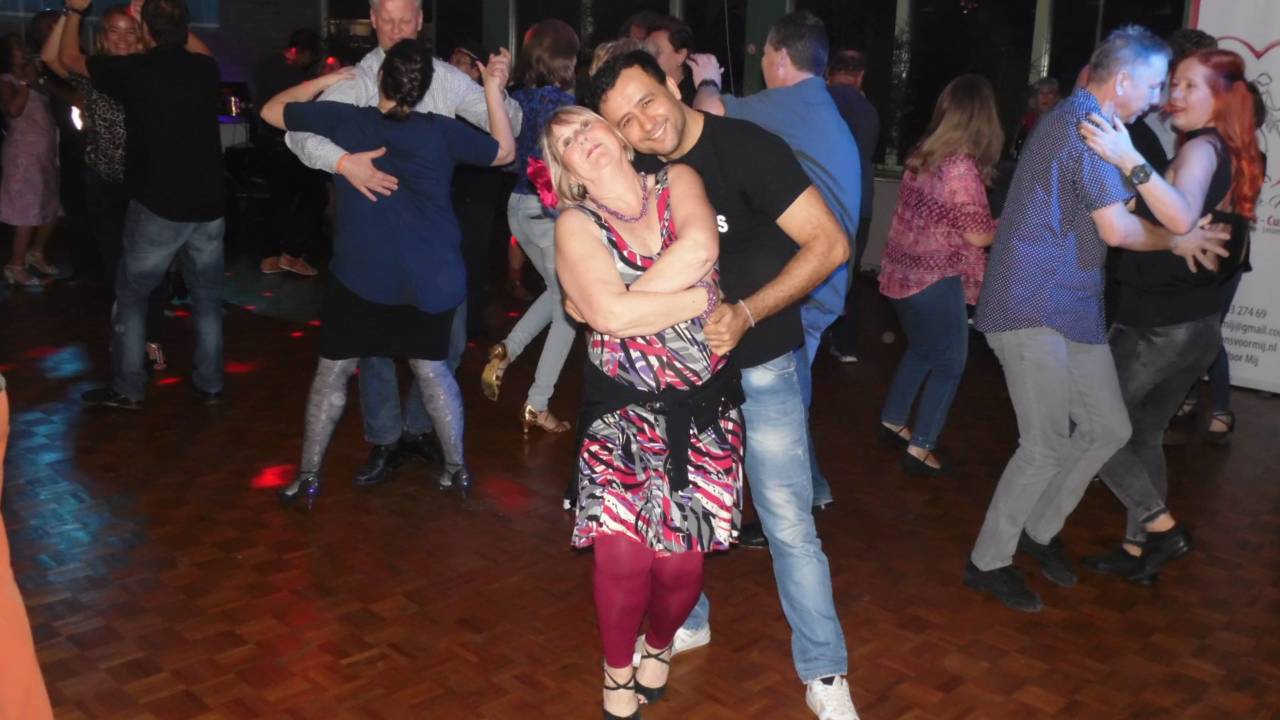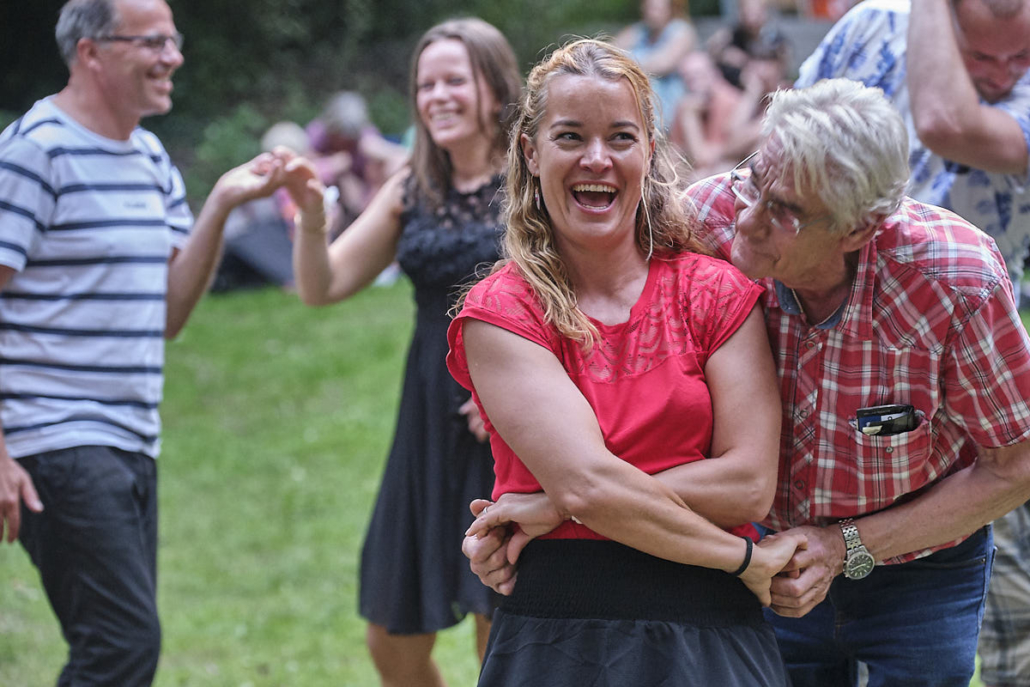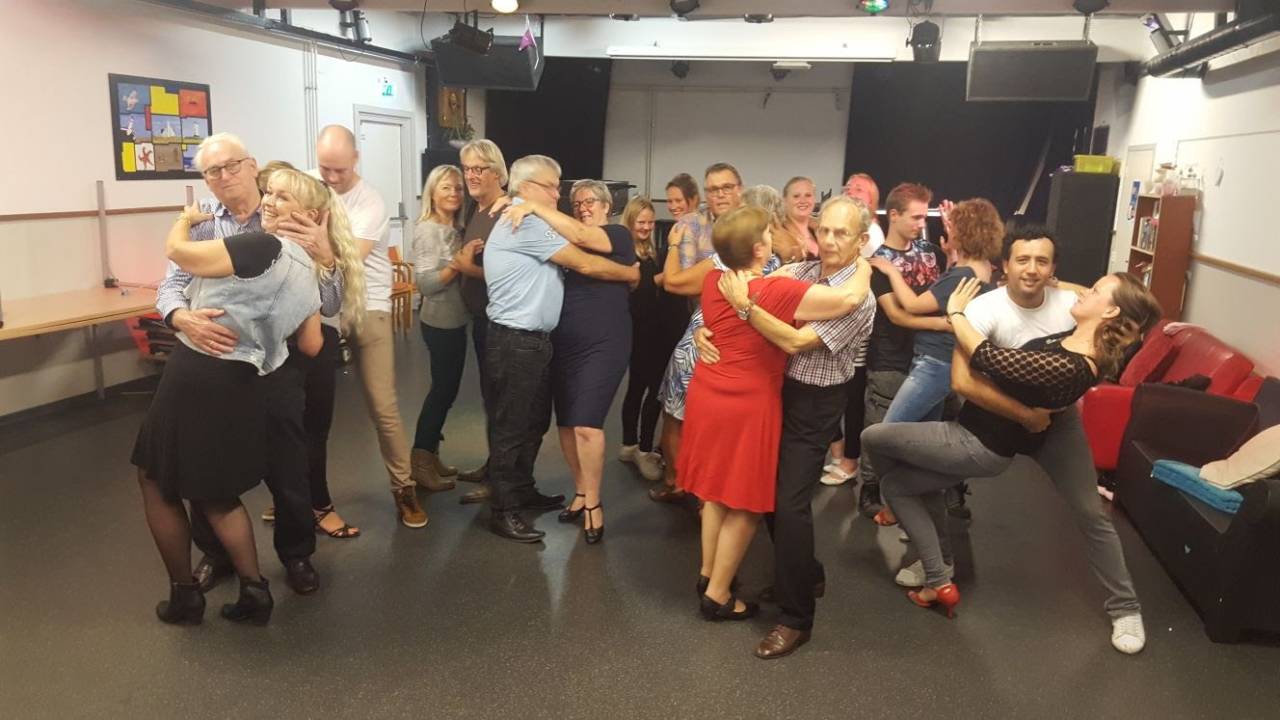Shaking things up: can dance reduce social isolation in Leiden?


In Leiden, residents of all ages and abilities are feeling the benefits of dance thanks to stichting Dans Voor Mij, which aims to build connections between people and reduce social isolation. Deborah Nicholls-Lee reports.
At the soft, melancholic sound of Nana Mouskouri’s ‘Only Love’ (1985), residents at the Topaz Overrhyn residential nursing home, day centre and rehabilitation centre in Leiden – most elderly and with severe dementia – begin swaying their arms and singing along.
Slowly, the circle formed by their 30 or so seats begins to break up, as participants – with and without wheelchairs – accept the invitation of staff and volunteers to come to the centre and dance. Others simply enjoy holding hands with someone singing to them, taking in the experience from their seat.
The popular session, led by professionals at the nursing home with the help of volunteers, is one of many dance experiences supported by foundation Dans Voor Mij (Dance For Me), founded by Serdar Ozdemir (45) in 2016.
Inclusivity is central to the concept, so all events are either free or ask for a small voluntary contribution. ‘The face of Dans Voor Mij is everybody,’ explains Ozdemir. In the suburb of Merenwijk, for example, where he grew up, he has brought dance to the youth work he does there to instil in the children a sense of agency and self-belief. For adults, there are free afternoon dance lessons and latin workshops in and around Leiden, often segueing into late-night parties.
Lessons
When he’s not dancing, Ozdemir works as an account manager for the province of Zuid-Holland and he also teaches boxing. His dance journey began when one of his boxing students, a salsa teacher, needed some more men to make up numbers and Ozdemir agreed to go along to the lessons. He picked up the basics quickly and began attending free-style salsa evenings where it became clear that he had a natural ability to bring out the best in his dance partners, whatever their level.
‘They said that I can lead them in a gentle way that teaches them nice moves that they didn’t know they could do,’ he says. He continues to be amazed by the power of dance – whatever form it takes – to improve mood and self-esteem. He says: ‘People who think they can’t dance, I see them changing’.
Three years ago, amateur dancer Mirella Boekkooi (33) had just come out of a difficult long-term relationship. She met Ozdemir one evening at a latin dance party at a sports centre in west Leiden. He invited her to learn to dance with him, spotting straight away, she says, that she was unhappy and that this was somehow blocking her ability to move forward with her dancing.

‘I learnt so much; I was no longer this stiff plank – he really helped me loosen up and relax,’ she says. ‘He showed me how nice dance can be, how it sets you free and can make you really happy, and that you can meet so many new and lovely people in the dance world.’ The pair became great friends and today Boekkooi volunteers for Dans Voor Mij, helping others find their dancing feet.
Dans Voor Mij brings together dancers of all backgrounds and (dis)abilities ‘to help people coming from isolation to develop themselves beyond their comfort zones’ and ‘to open their heart and make steps to meet other people’, explains Ozdemir. It clearly works: Ozdemir is currently choreographing the wedding dance of a Congolese man and Iranian woman who met at one of his events and Mirella Boekkooi is now engaged to his brother.
Back at Topaz, I must overcome my own inhibitions, so I invite Dick, a friendly-faced man across the circle from me, to dance. He jokes his name matches his physique [Dik means fat in Dutch], and the ice is quickly broken. One of the youngest in the room, he’s up for plenty of spinning and hip action, and as we bop around the space, it’s easy to forget the debilitating dementia that brought him here.
After a sing-along to folk song ‘Sarie Marijs’, there’s a break for squash and biscuits and a chance to chat. Resident Jan Powels (77) tells me that he enjoys the change of scenery that the session provides. ‘There’s all different types of music, he says. ‘I am happy … It’s really lovely to be here.’ For others, dementia has made conversation impossible but, says volunteer Willeke Pijnaken (61), ‘with the dance and the music, they can communicate – just not with words.’
The idea of Dans Voor Mij – as the name suggests – is that ‘you dance also for people, not only with people’, explains Ozdemir. He admits he also gets a lot from the sessions, particularly at Topaz: ‘I see them [the residents] like my grandparents. It gives me energy’. When his grandmother died, Dans Voor Mij, he says, ‘filled the pain I had’.

Ozdemir’s talent for building connections is clear as he coaxes the residents onto the dance floor. ‘You’re one of my best dancers,’ he tells one lady who is hesitant to take part, stroking her arm, maintaining reassuring eye contact and exchanging smiles. Receiving attention, he explains, means everything to the residents. Ozdemir’s gift for dancing means he also receives significant attention at the dance evenings and workshops he organises, but dancing with the residents of Topaz, he says, ‘is the most beautiful podium I had in my life.’
The session closes with ‘Droomland’, a Dutch classic dating back to the 1930s, and I notice that one lady – despondent, with her head hung low at the start – is now sitting up, gently waving her hands and singing along to the music. ‘After half an hour of listening to music from their youth, residents come to life again,’ explains Mirjam Brouwer (55), the activities leader at Topaz Overrhyn. ‘For a few minutes’, she says, ‘you can be free again from your disease. It’s a miracle’.
Topaz is special to Ozdemir, but the Dans Voor Mij concept is suited to numerous settings and he is reluctant to target specific groups. Social exclusion can affect anyone, he says. ‘We try to be known by everybody. That’s the first step. You don’t know which people need you.’
Thank you for donating to DutchNews.nl.
We could not provide the Dutch News service, and keep it free of charge, without the generous support of our readers. Your donations allow us to report on issues you tell us matter, and provide you with a summary of the most important Dutch news each day.
Make a donation